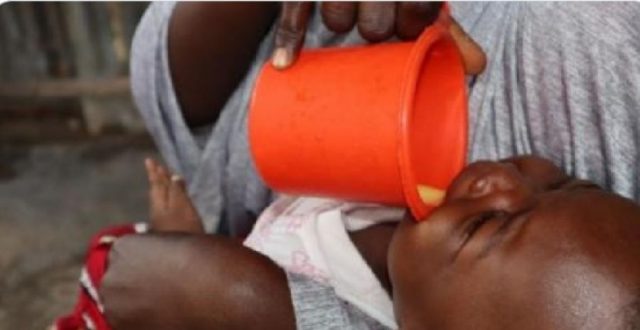SAT, 01 OCT, 2022-theGBJournal| Sitting on a wooden stool in front of her house at Dobeli community in Yola North Local Government Area (LGA), Hajara Yusuf, a (27 years old mother of three) was coaxing her sons to take the seasonal malaria chemoprevention (SMC) drugs.
“I usually look forward to when they administer the periodic malaria drugs because I have seen first-hand how it prevents children from falling ill. Previously, I used to refuse the drugs because I was not sure what it was until a community health educator explained the benefit.
Afterwards, I tried it with my second child (Tsoho) because he was always falling ill and since then, he has been healthy. Two of my children are among the eligible group entitled to receive the drugs and I have since taken it upon myself to look out for every time there is a campaign to guarantee my children receive their dose. I also encourage other mothers to collect for their children. Since Tsoho and his sibling began receiving the SMC drugs, I have spent less money on drugs, and this has given me ample time for other things” she said.
Mrs Yusuf said she is usually sad when she sees her son not playing around with other children.
“But right now, I am happy that he plays and runs around just like other children. And I remain committed to ensuring they are available to receive their drugs across all four cycles and will also be a champion of such benefits to other mothers, said Mrs Yusuf.
The young mother of three is one of the beneficiaries of the SMC drugs distributed in Adamawa State to almost one million children across the 21 LGAs, with the support of the World Health Organization (WHO) and funding from Global Funds through the National Malaria Elimination Programme (NMEP).
SMC is administered monthly for four months during the highest malaria transmission periods, using Sulfadoxine-Pyrimethamine (SP) and Amodiaquine (AQ) (SPAQ) to children aged 3 – 59 months to reduce the cases of malaria outbreaks which are usually on the increase in the country during the rainy season.
A persistent threat
In Nigeria, malaria caused by bite of infected female Anopheles mosquito is one of the leading public health problems and poses a threat to the entire population, with children and pregnant women being most vulnerable to severe disease and death.
Ending malaria transmission by 2030 remains a top government priority as Nigeria is one of the four countries accounting for just over half of all malaria deaths worldwide.
According to the latest World malaria report, Nigeria accounts for 27% of all malaria cases and 32% of deaths globally.
To reduce the burden of the disease, the WHO recommends, among other interventions, the SMC intervention for children aged 3-59 months living in areas of high malaria transmission to protect against malaria during the rainy season.
Other WHO recommended interventions aimed at controlling malaria include vector control through use of long lasting insecticidal nets, Indoor residual spraying. all suspected cases of malaria be confirmed using parasite-based diagnostic testing (through either microscopy or a rapid diagnostic test). Diagnostic testing enables health providers to swiftly distinguish between malarial and non-malarial fevers, facilitating appropriate treatment.
Continuous intervention
Applauding the WHO for continuously supporting the state government to provide quality health services for the populace, the Adamawa state Director for Public Health, Dr Celine Laori, said the September malaria prevention campaign is the fourth and last cycle of the SMC routine for the year.
“We appreciate WHO’s outstanding leadership and commitment throughout the four cycles. They supported the state in building the capacity of health workers, which propelled them to provide adequate services throughout the exercise,” said Dr Laori.
Upholding the importance of the campaign, the northeast Emergency Manager, Dr Richard Lako, said WHO has remained a dedicated partner in supporting Adamawa state in achieving the global targets of reducing malaria case incidence and mortality rate by at least 90% by 2030.
“The SMC campaign will complement the efforts of the Adamawa state government to provide quality health services for the people. The WHO will continue to provide technical support, including capacity building, to increase early disease detection in the state, especially in the hard-to-reach locations,” said Dr Lako.
Twitter-@theGBJournal| Facebook-The Government and Business Journal|email: gbj@govbusinessjournal.ng|govandbusinessj@gmail.com










